Lebanon 2014: a photo-memoir. Part one: welcome to Beirut
Two years ago I was privileged to visit the Lebanon. In four or five instalments, these are some memories and images of that journey. (Part two is now available here)

We’re in Belfast’s only Lebanese restaurant - a cafe, really - with my daughter. I’m pontificating about, and possibly even mansplaining, the intermingled food cultures of the near east. How the Ottoman Empire opened the Levant, the Balkans and southern Europe to the cuisines of north Africa, the Middle East, and Persia. And that’s before you factor in the impact of colonial powers like England (no major culinary gift to the world, true) and France.
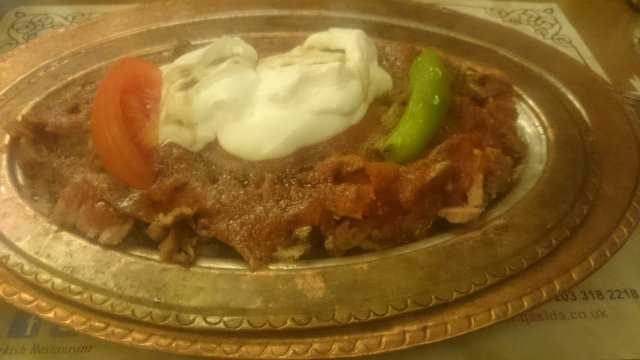
Abbas, the cafe owner, overhears and, maybe to save my companions any further ‘education’, asks if I’ve been to the Lebanon. It’s a country I’ve been fascinated by since my teens, when the television images of the civil war seemed a warped, exaggerated but still useful reflection of the Troubles at home in Ireland. And we’ve considered it, for my upcoming fiftieth birthday. But the situation in Syria…
Abbas is insistent. It is perfectly safe. We’ll love it. He gives me the phone number of his friend, who will drive for us if we want. We promise to look into it…
Rafiq Hariri International Airport lies on the shore to the south of the promontory occupied by West Beirut and the old city. Instead of a movie on the seatback screen, I watch an animated version of our British Airways flight approach a stylised map of the Lebanese coast, and the airport itself. The plane banks and turns into its approach. Closer… closer… then the engine noise rises and we tip sharply back out over the Mediterranean. The tiny woman beside me, who has spent most of the flight cross-legged on her seat, is almost flung into the aisle. The cartoon 737 on screen swerves violently. There are gasps and muttered curses around the cabin.
The pilot apologises as he eased us back for another approach. The flight before us hadn’t cleared the runway. But everything is fine now. Welcome to Beirut!
I’m still a little dazed when we check in to our hotel. Janice is splashing out on this leg of our trip, a birthday present, but I feel like a shabby fraud among the luxury and the glamour of the hotel on the Corniche, the long avenue that tracks the city’s shore. From our balcony, the traffic far below honks and parps and beeps and doesn’t seem to move.
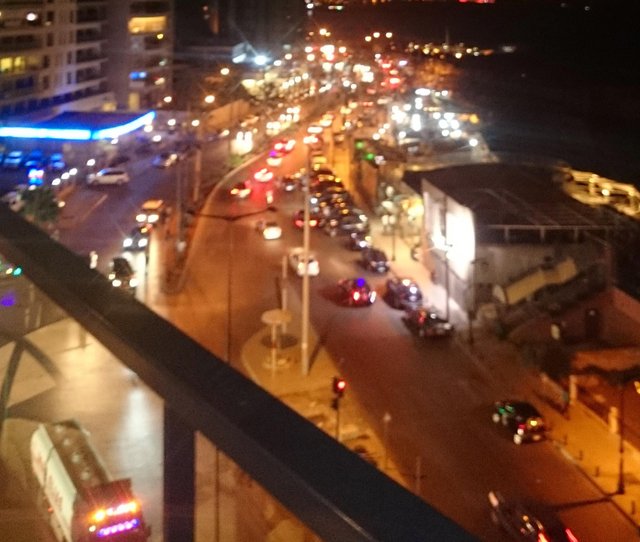
Just off shore, surf breaks against the Raouche, or Pigeon Rocks.
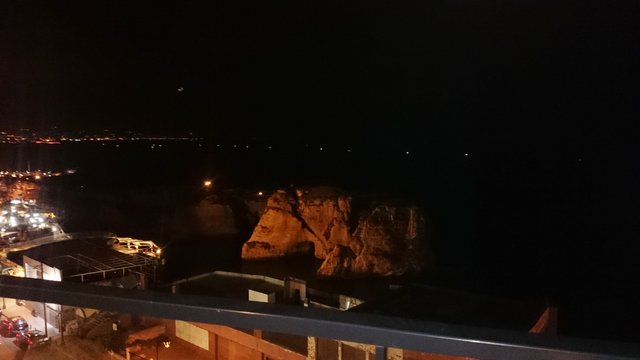
In the morning the surf is calmer, the traffic parps and honks and beeps. In daylight, I can see that it is moving, slowly but inexorably, lanes of cars - are they all Mercedes? - merging and parting and parping and farting and passing around the traffic policeman with his sub-machine gun on his little concrete plinth, under his concrete parasol. The Lebanese flag flies from the larger of the Pigeon Rocks.
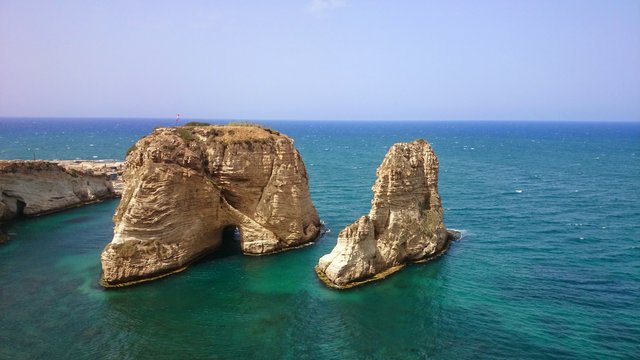
We go out for breakfast, to smell and taste the city. There are cafes on our side of the Corniche, but we want, first, to join the Beirutis already promenading, jogging, hanging out, arguing, chilling on the promenade overlooking the sea. It’s just there, that promenade. Across an impossible river of ageing Mercs. No-one’s moving very fast, but they’re bumper-to-bumper, and the cacophony of horns is disorienting. We hesitate, gormless tourists, at the kerbside. Then a driver gets out of a taxi and asks where we want to go. Clearly, he smells a fare. Over there, we point. The traffic beeps and honks and parps. Okay, he says, easy. Come! He takes Janice’s hand, then he takes my hand, and strides straight into the lava-flow of Mercs, and through, hardly weaving at all, and the traffic doesn’t seem to slow, and no-one seems to have to swerve, and suddenly he’s saying goodbye and welcome, welcome to Beirut! It’s a miracle.
We can get beer in the hotel, but it’s expensive. We can pick up beer and wine and raki in small shops in the backstreets behind the hotel, near the heavily-fortified embassies and the bunker-like HQ of the Syrian National Socialist Party. Hmm. And it’s expensive too. We know from our map - more on that map later - that the chilled-out district of Hamra is only a few streets away, but our first forays are unsuccessful. We find ourselves returned to our starting point, or being disgorged from the backstreets at a point no more than a hundred yards from our hotel.
We have booked organised tours. The first is a visit to the National Museum. Our guidebook reminds us that the museum, on the Green Line between Muslim West and Christian East Beirut, ‘took a pounding’ in the civil war. We watch a film showing how the larger artifacts, that could not safely be removed, were encased in concrete like mafia stool-pigeons. The film recorded their peacetime dis-entombment, and its was revelatory, hallucinatory: the late-twentieth century being peeled away to reveal Byzantium, Rome, Greece, Egypt, Phoenicia…
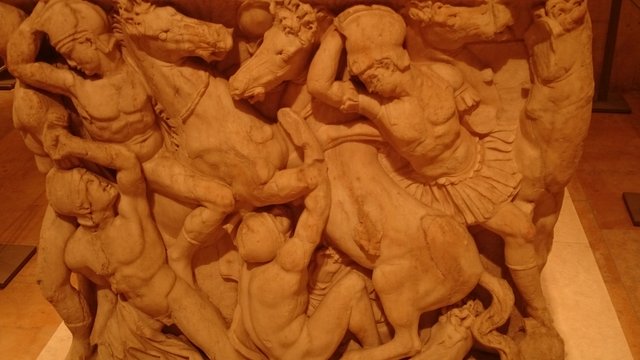
It’s a spellbinding small museum, with moments of something like vertigo when you suddenly understand the historical gradient you’re on. Like a mountain in crisp winter air, the past falls steeply away but goes on for… well, for as long as history itself, a dance of weaponry and gods and kings and tiny figurines in bronze and clay.
We tell our guide that we’re not far from our hotel - we’re not, as the crow flies - and want to make our own way back. She looks grimly disapproving, like a schoolteacher who knows your proposal will end badly, but sees some educational benefit in the disaster you’re about to unleash. But it will be fine. It will be grand. We have a map.
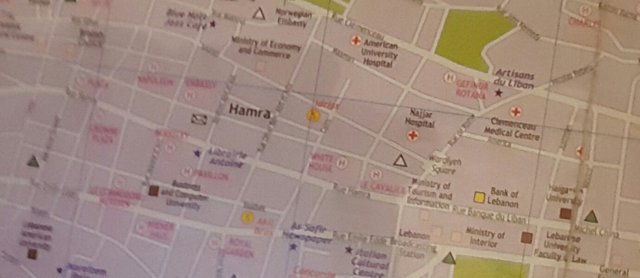
The map is not one hundred per cent right… Which is only to be expected in a city that has been fought over, remodelled, shelled, demolished, subverted, mortared, privatised, covered-up and exposed since at least the Roman period.
A day or two later we are in the modern downtown district, where fraught Lebanese parliamentarians are trying to agree a president [note in 2016: and hey! More than two years later, they just have!] and our second guided tour is being rerouted by heavily-armed security police. Our guide speaks forcefully but politely to young men in camo. But no, we cannot visit… whatever. But right beside the parliament district, ancient Roman bath foundations, a hypocaust. Two thousand years…
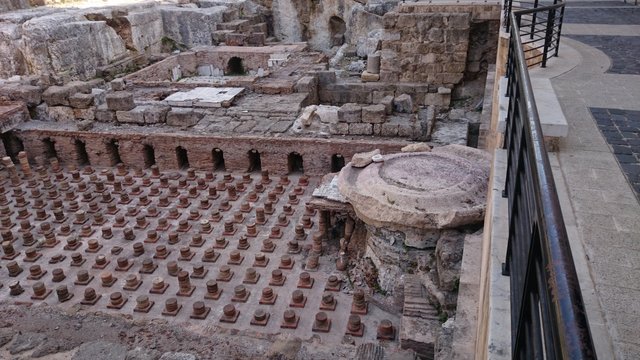
Two thousand years. Two hundred years. Thirty years. We turn away from the political district and face the liberation memorial, celebrating Lebanese independence - from France, from Syria, from the Ottomans, who knows? - which is peppered by bullet holes from the civil war. We are right at the end of the Green Line here, and it feels like Beirut’s pain is concentrating in this Martyrs’ ‘square’, a traumatised kind of waste-ground clogged with traffic and side-on to the great mosque and the mausoleum of Rafiq Hariri, murdered by a car bomb on the Corniche not far from our hotel.
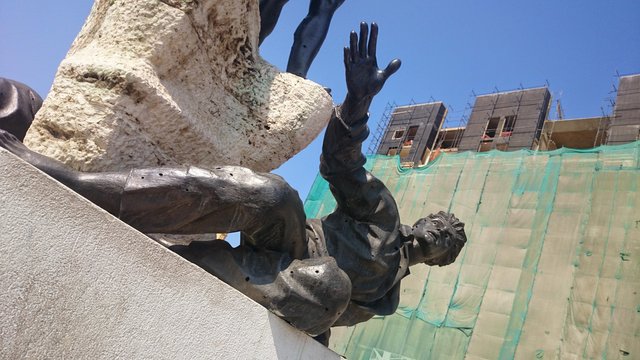
I have imagined this city, this country, for years. I am finally here.
Hello @martinmooney,
It gives us pleasure to inform you that this post have been upvoted by Project Better.
The Mission of Project Better is to reward posts have many votes from Minnows but earn pennies.
Your payout is $0 before we vote on your post.
Learn more about the Project Better here! ,
Want to donate your voting power to support Project Better and earn curation rewards? Click Here!
We hope to see you continuing to post some great stuff on Steemit!
Good luck!
~BETTER~